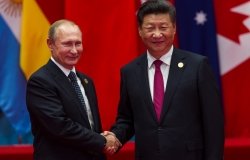Cross-Strait Economic Ties: Agent of Change, or a Trojan Horse?
Ramon H. Myers, Hoover Institution; Terry Cooke, GC3 Strategy Inc.; Tun-jen Cheng, College of William and Mary; Rupert J. Hammond-Chambers, U.S.-Taiwan Business Council
Overview
Download the Special Report in PDF format
Ramon H. Myers, senior fellow of the Hoover Institution; Terry Cooke, senior fellow of the Foreign Policy Research Institute, Philadelphia; Tun-jen Cheng, professor of political science, College of William and Mary; Rupert J. Hammond-Chambers, president of the U.S.-Taiwan Business Council.
Despite pervasive political distrust and hostility across the Taiwan Strait, economic exchange between Taiwan and mainland China has developed swiftly in recent years. What has been its impact on Taiwan’s domestic economy, and on the bilateral relationship? Does the mainland pose an opportunity or a threat to Taiwan’s development? Does the United States have a role to play? Four speakers examined these and related issues at a November 3 seminar hosted by the Woodrow Wilson Center’s Asia Program, including Ramon H. Myers, Terry Cooke, Tun-jen Cheng, and Rupert J. Hammond-Chambers. On the next day, Myers and Cooke spoke at a Capitol Hill breakfast seminar for congressional staff on the same topic.
Myers started the discussion by arguing that no evidence suggests that mainland China has adopted trade policies that will force Taipei to accept Beijing’s political demands. Expanding cross-Strait economic relations mutually benefit both sides. According to Myers, if the Taiwanese government can formulate a win-win strategy toward mainland China, it can retain its position in the emerging Chinese market, which is expected to replace Taiwan as the largest manufacturing agent of high-technology products.
Cooke observed that the global supply chain for Information Technology (IT) products has been extending steadily across the Taiwan Strait and is a win-win game for both sides. Leverage in the IT sector is not as much in the hands of politicians in either Beijing or Taipei as in the hands of Taiwan’s globally-experienced IT firms. Economic globalization will bring about regional stability and reduce military and political tension across the Taiwan Strait.
According to Cheng, in the foreseeable future, Beijing is unlikely to coerce Taiwan politically and militarily by flexing economic muscle as many Taiwanese fear. Taiwanese businessmen on the mainland are not agents of Beijing at advocating pro-unification policies. However, because of the concentration of Taiwan’s trade with and investment in China, a greater hazard is recession or currency fluctuation on the mainland, Cheng observed.
Hammond-Chambers offered his commentary at the end of the seminar. He argued that while China’s opening market has provided new opportunities for Taiwanese businessmen, the increasing competitiveness of Chinese industries has also posed a threat to Taiwan’s economy. Moreover, by encouraging regional economic integration without Taiwan’s participation, Beijing has tried to marginalize Taiwan’s economic role in the Asian-Pacific region, Hammond-Chambers added.
In brief, this seminar explored both opportunities and challenges of cross-Strait economic ties for the two sides’ domestic economic development. While the four speakers agreed on the uneasy political relations between the two sides, they differed on whether the growing cross-Strait economic ties will necessarily bring about benefits to Taiwan and reduce tension across the Taiwan Strait.
Drafted by Gang Lin, Asia Program Associate
Robert M. Hathaway, Director, Asia Program
Ph: (202) 691-4020
Hosted By

Indo-Pacific Program
The Indo-Pacific Program promotes policy debate and intellectual discussions on US interests in the Asia-Pacific as well as political, economic, security, and social issues relating to the world’s most populous and economically dynamic region. Read more
Thank you for your interest in this event. Please send any feedback or questions to our Events staff.










